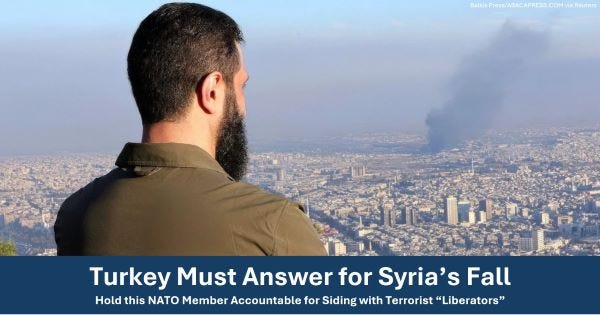|
 |
The Disastrous Collapse of Syria: A Harbinger of Greater Regional Instability
A NATO Member Aligns with Terrorists
The recent fall of the Syrian government under President Bashar al-Assad marks a profound shift in Middle Eastern geopolitics, with implications far beyond the borders of Syria itself. The collapse, orchestrated by a coalition of insurgent forces led by Hay'at Tahrir al-Sham (HTS) under the leadership of Abu Muhammad al-Julani, has revealed the fragility of the once-powerful Russia-Iran-Syria-Hezbollah alliance. This alliance, which has long supported Assad, was unable to muster the strength to intervene, leading to Assad's retreat to Russia for asylum.
The timing of this collapse is not coincidental but rather a calculated move in a weakened geopolitical landscape. Hezbollah, traditionally a strong ally of the Assad regime, has been stretched thin along Lebanon's southern border due to ongoing conflicts with Israel. Meanwhile, Russia, bogged down in Ukraine, lacks the resources to engage effectively on another front. Iran, facing economic sanctions and internal dissent, also finds its capacity to support its allies severely diminished.
Turkey's President Recep Tayyip Erdogan, seizing this moment of weakness, has tacitly supported HTS's offensive. Erdogan, who views himself as a leader of the Sunni Muslim world, has leveraged this situation to advance his geopolitical ambitions, which include diminishing Western influence in the region to foster a resurgence of Islamic governance. This support for HTS, led by Abu Muhammad al-Julani, an Al-Qaeda operative who was once arrested by U.S. forces in Iraq and met with the infamous Abu Bakr al-Baghdadi, indicates a strategic alignment with radical elements to achieve broader regional influence.
Julani, having renamed his group from Jabhat al-Nusra to HTS, which translates to "The Organization for the Liberation of the Levant," has declared intentions that go beyond merely controlling Syria. The term "Al-Sham" historically refers to a vast region encompassing modern-day Syria, Lebanon, Jordan, and Israel. His vision, expressed through declarations of freedom and independence, implicitly involves these territories, declaring their motive for an expansionist agenda that could destabilize the entire Middle East.
The implications for Israel are immediate and severe, prompting rapid military deployments along the Syrian border to brace for potential escalations. Israel, already dealing with multi-front threats, now faces a scenario where a radical Islamic group, with state sponsorship, could challenge its security from the north.
The situation escalates concerns about Turkey's role within NATO. Erdogan's actions, aligning with a joint Al-Qaeda-ISIS group like HTS, raise alarming questions about Turkey's alignment with Western security interests. The possibility of leveraging Turkey's NATO membership, potentially by threatening expulsion, might be one of the few diplomatic tools left to curb Erdogan's support for radical Islamist movements. This could force Turkey to reconsider its strategic calculations, especially if the West threatens to isolate it from crucial military and economic partnerships.
The collapse of Assad's regime and the rise of HTS under Julani's leadership are just the tip of the spear. This is the beginning of a broader movement to reshape the Middle East, potentially leading to an immediate escalation in Lebanon, which is also in a weakened, vulnerable state.
This has nothing to do with liberation and everything to do with expansionism.
It's time to drag Turkey's President Erdogan into the harsh light of accountability for his blatant role in tearing down Syria to gain power in the region. This isn't just about meddling in another country's affairs; it's about Erdogan's twisted dream of reviving an Islamic empire, echoing the dark days of the Ottoman rule. His ambition stretches across the so-called "greater Syria," eyeing Lebanon, Jordan, and Israel with the same predatory gaze. Erdogan has blood on his hands from fueling the chaos in Syria with his support for Islamist radicals, all while dreaming of expanding his caliphate. The world must wake up, confront this aggressive expansionism head-on, and stop Erdogan's power-hungry march before he plunges the entire region into further turmoil. It's time for justice, accountability, and to say a resounding NO to Erdogan's imperialistic fantasies.
"Erdogan must make a clear choice: stand with the civilized world and uphold his NATO commitments or continue his dangerous dance with terrorist groups like HTS—you cannot straddle both sides of this divide!" – Brigitte Gabriel
WE DEPEND ON YOUR SUPPORT! With your annual subscription, RECEIVE YOUR FREE COPY of my NY Times Bestseller, ‘Because They Hate,’ while supplies last. You are delivering REAL RESULTS with your support!


